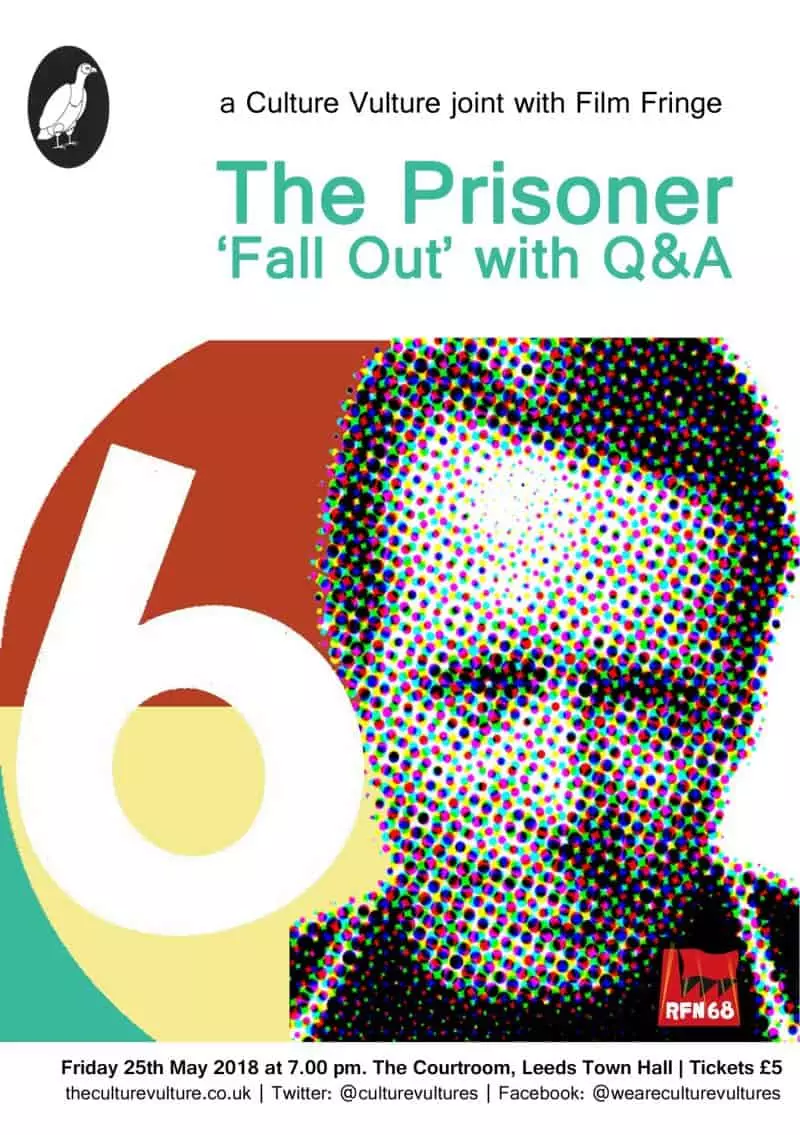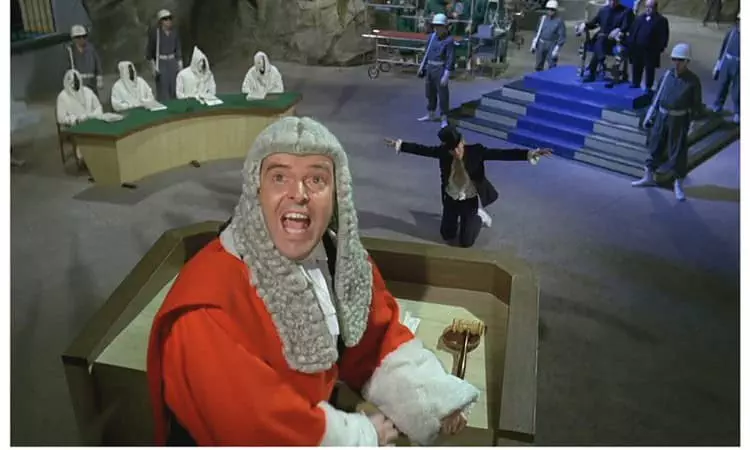Author and Prisoner aficionado, ROGER LANGLEY, is not a number, but if he was he would be Number 1, at least where Six of One, the Prisoner Appreciation Society is concerned. He talks to theCV’s NEIL MUDD about why The Prisoner continues to captivate and baffle audiences fifty years on…
In case you might be thinking Roger Langley is some kind of modern day Elizabeth Fry, he is less concerned with penal reform than with the cult sixties television series The Prisoner starring Patrick McGoohan, the final episode of which – Fall Out – was first broadcast in the UK and US fifty years ago.
The Prisoner was the daddy of television shows like Twin Peaks (Ask Phil Kirby. He knows!), a brilliantly original, provocatively ambiguous antidote to the run of the mill telly fare of its day. McGoohan’s adventures as Number 6 have been the catalyst for scores of books down the years, each promising to unravel the show’s many riddles.
Roger Langley knows more answers than most. Not only does he help run Six of One, the Prisoner Appreciation Society, which formed in 1977, but he has published a number of books on the subject, including a trilogy of Prisoner novels and a biography of the show’s star and co-creator, Patrick McGoohan.
theCV caught up with Roger to discuss The Prisoner ahead of our screening of Fall Out in the Courtroom in Leeds Town Hall on 25th May, our Joint with Film Fringe for the Radical Film Network’s Spirit of 68 pop-up festival in Leeds.
theCV | When did you first encounter The Prisoner? Were you familiar with McGoohan’s role [as spy John Drake] in Danger Man?
Roger Langley | I watched the first screening of The Prisoner [the show was broadcst on various regional ITV channels in the UK] when I was much younger. Unfortunately, at that time, broadcasts were only in black and white, so it was not until a decade later when colour TV arrived that I could see the series as it was originally filmed. I had been lucky enough to see some early Danger Man episodes as I used to visit an aunt who had ‘piped’ television, an early sort of cable. On Sunday evenings, when much of the country could not yet receive ITV, I was able to watch what I thought were quite classy Danger Man short, action-adventure stories. They haven’t aged as well as The Prisoner, although some of the much later final episodes were clearly moving towards similar concepts or situations: secret prison village, dream sequence, altered identity, etc.
theCV | Lew Grade’s production company ITC was a bit of a fixture of early evening television with shows like The Saint and Randall & Hopkirk (Deceased) when I was growing up. However, only The Prisoner has spawned such obsessive close scrutiny. Why do you think this is?
Roger Langley | Patrick McGoohan said he wanted to challenge viewers to think, argue and question what they were seeing on screen. He thought a lot of television was not worth watching and limited his own children’s viewing. From that basis, the writers were given an unprecedented free rein and came up with stories unlike anything normally encountered on mainstream TV. Viewers began to complain, press features asked what was the meaning behind it all, and a culture of dissecting The Prisoner and its mysteries evolved. Countless theories were put forward and so the series attracted much discussion and analysis, even leading to educational courses being offered and psychological ‘expert’ interpretations being presented with some screenings.
theCV | There have been many books on the subject, but which writers for you have come closest to solving the mystery of The Prisoner?
Roger Langley | I doubt that anyone could claim to have covered every aspect of the show. It is often said that something new is seen in the series after a later viewing and there are plenty of people around the world who have watched The Prisoner many times during the past thirty years since videos and DVDs appeared. The only individual who ‘had the answers’ was McGoohan and although he did some interviews, he never wrote about his creation. In any event, the writers’ own input, plus that of the art department and several directors took the series in new directions. Political comment on the times, or abuse of power, use of drugs, torture and educational manipulation were not seen in the other more standard ITC shows.
theCV | We are screening the show as part of a wider festival to mark the 50th anniversary of May 1968. (Fall Out actually has its origins in late 67). How useful is Ian Rakoff’s suggestion that The Prisoner is radical television produced in turbulent times
Roger Langley | I don’t share some interpretations of Fall Out, but do believe that each person’s views are as valid as the next, as the meaning behind The Prisoner’s finale depends on what the viewer sees in it. Naturally the bomb and war are referenced, (as are) space travel, religion and the freedom of the individual. I have even compared Fall Out with elements of the movie McGoohan had just made (Ice Station Zebra) which took him away from filming at the end of the series. Elements of the Cold War submarine blockbuster were in some ways, to me, reprised in Fall Out.
theCV | Is The Prisoner a template for today’s television drama? (Much has been made of McGoohan gleefully going into hiding after the screening of the last episode.)
Roger Langley | There could never be a return to the type of TV which existed in the Sixties. The freedom programme makers had is long gone and much of today’s fare presents ordinary life, or ‘reality’ situations, with dramas being limited to period stories, or crime, or featuring an unbalanced doctor or cop. Recently The City and the City was a fair attempt at something different, but was not comparable to The Prisoner, being on BBC2 and not presented to an unsuspecting public on primetime TV as had been the case with McGoohan’s production.
theCV | My colleague Phil has enjoyed exploring The Prisoner in light of various conspiracy theories – MK Ultra, Acoustic Kitty, etc. Do you have a particular favourite that can be applied to the show?
Roger Langley | McGoohan believed that organisations, be they governmental, military or some covert service, had secret establishments where subjects could be conditioned, or have knowledge extracted from them. He commented on prisoners of the Vietnam War, looking as if their personality had been ‘wiped’, or they’d been brainwashed. Nowadays we hear of spy satellites, ‘listening’ posts, undercover agents and a host of surveillance tech, from street cameras to bugged ‘smart’ devices. I, like McGoohan, had no particular conspiracy theory, but The Prisoner’s script editor George Markstein was much more specific about the special services, wartime operations and people who were held captive for ‘knowing too much’.
theCV | Can you briefly describe the role of the Prisoner Appreciation Society?
Started over forty years ago, the basic aim was to share in discussion of the series and, as was said in the early days, to embrace the ideas and ideals of the show. McGoohan was our honorary president up to his passing in 2009 and I often spoke to him about the production. My biography of the actor (Patrick McGoohan: Danger Man or Prisoner?) was published in 2007 and I sent him a copy in time for his eightieth birthday, which was well received. We remain in contact with the actor’s widow and eldest daughter, along with some of the cast and crew. Over the years we had many of the actors and production team members at our events. Nowadays we have the annual conventions in Portmeirion, we participate in the Festival Number 6 there each year and produce the glossy magazine Orange Alert three times a year. There are a number of society websites and Portmeirion has its own Prisoner shop.
theCV | If you were to introduce our screening of Fall Out, what would you wish to draw out?
I would not want to give away too much, but I would say how the previous episode Once Upon a Time (scenes from which are reprised at the start of Fall Out) was filmed many months earlier and was never intended to form a two-parter with the finale. However, as the series was being curtailed, McGoohan had to create a conclusion; at the time most of the crew were aware that there was no ending and the star even told the press that he had not yet written it. As things turned out, he wrote and directed both segments, the former referencing his own life and the latter presenting his worldly views. I would say that the star wanted to ’go out with a bang’, with, according to him, much allegorical content. His ‘message’ was presented for only a few seconds towards the end and the final scenes have no dialogue for almost a third of the episode’s running time. Fall Out bore no relation to the rest of the series and as with The Beatles (the group’s All You Need Is Love is heard twice in Fall Out) the artistic freedom and experimentation was notable.
theCV | What’s the one question about The Prisoner you wish you had the answer for?
Roger Langley | There is more than one: some simple, some less so. Where is the film of the 1967 Prisoner press conference which nobody has ever seen? Was there really a ninety minute pilot of the opening episode Arrival which was cut down to almost half its running time? Did McGoohan intend to make people think that Number Six was John Drake from Danger Man, even though he denied it? Was the final shot, which mirrored the opening shot in Arrival, meant to indicate that the events were cyclical, or that the prisoner was once again a free man? After all, the door to his house shut automatically, suggesting that he was out of The Village, but that the organisation was still all about him. A proposed second series would have taken the prisoner out into the world, being watched and followed. Which brings me to my ultimate question, why was The Prisoner brought to its premature end?
For more information about Six of One – The Prisoner Appreciation Society, click here.
Roger Langley is the author of Patrick McGoohan: Danger Man or Prisoner. More details here.
theCV presents The Prisoner Fall Out plus a Q and A with Six of One’s Ant Brierly and Roy Stambrow moderated by Phil and Neil (God help us!) at The Courtroom, Leeds Town Hall at 19.00 on Friday 25th May 2018. Tickets are £5 (plus booking fee) and are available here.

